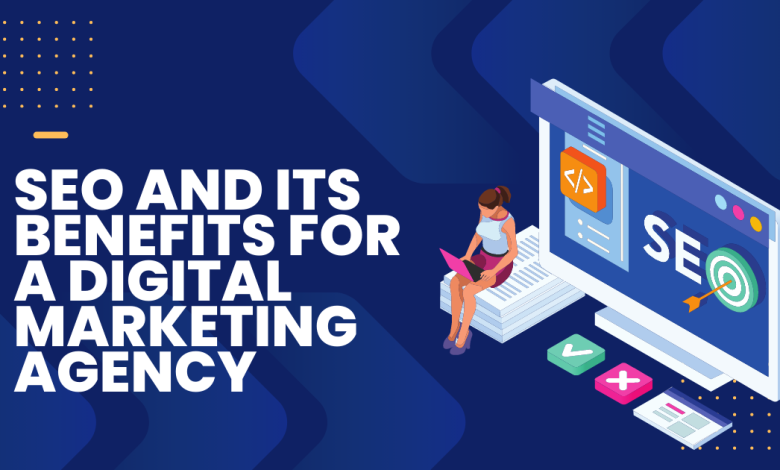SEO and Its Benefits for a digital marketing agency

Ranking on Google’s first page is crucial to your online business’ success. Your target audience won’t see your brand if your business doesn’t rank on Google’s 1st page.
This is where Search Engine Optimization comes into play. Improving a website’s visibility on search engine results pages plays a significant role in a digital marketing agency if you have one. More traffic means more potential customers will see your website.
How Does SEO Even Work?
Google, Yahoo!, and Bing are popular search engines that use automated crawlers to crawl different web pages. These crawlers go to every page and every site on the internet, collecting information from those pages to index.
Once this information has been collected, an algorithm is used to analyze those pages and rank them based on specific criteria. These criteria determine how web pages will appear in search results when a particular query is entered or searched on the platform’s search engine.
Google is well-known for its ability to update its algorithm to rank websites in digital marketing agencies and search engines. This update is primarily due to two reasons: (i) the user experience of Google’s search engine can continually improve and (ii) because Google actively tries not to allow Black hat SEO techniques or attempts to manipulate its search algorithm.
What is the Difference Between Off-Page and On-Page SEO?
When creating your strategy, you may encounter two types of search engine optimization strategies. These strategies are critical to SEO success, but they also have distinct advantages.
On-page SEO is focused on website design and content you can control. Off-page SEO, however, focuses on increasing authority in your domain. This is a big difference. On-page SEO determines the keywords your website ranks for. Off-page SEO determines whether your SEO score is high/low.
On-page SEO
On-page SEO usually refers to any SEO techniques that are part of your site and includes the following components:
Title-tags
The title tags contain the keywords chosen for each page on the website. Marketers should be aware of several factors when creating an effective title tag. These include keeping the title tags under 60 characters, having the keyword sound natural with the brand name at the end, and limiting the keywords to 60 characters.
URL structure
Your website’s URL structure is essential as it allows search engine crawlers and readers to understand the page’s contents. Although it is not recommended that you change existing URLs, marketers must ensure that any new URLs include relevant keywords.
The website’s folders and directories must be labeled in a structured way to convey some meaning to the user. The URL structure of most online newspapers usually includes the website’s title, name of the news section, name of the article, and date.
Marketers should make URLs as brief as possible and ensure they are easily readable. It decreases click-through rates if the URL is too long.
Headings
The largest words on your website are likely to be the headings. Search engine crawlers give headings a greater weight because they have larger font sizes. Content marketers should include in headings (including H1, H2, H3, and H3) their selected keywords and the indicative content of the webpage.
Page load speed
Page loading speed is crucial for your page to rank well in SERPs. This is an important factor in your overall SEO score. Google ranks websites that improve the user experience. Therefore, optimizing your web pages should be faster loading to better rank in search engine results.
Marketers should reduce HTTP requests, decrease response time to less than 200 MS, enable compression, and keep the image size below 100kb to improve page load speed. Marketers can use Google’s Page Speed Insights tool to analyze a website’s performance on desktop and mobile. It then provides tips for optimizing your page speed.
Content
Your website should provide useful information and material that will value your target audience. If you are an online career counselor, your digital marketing agency should include blogs that offer step-by-step guidance, list the best courses to improve employability skills, and tips on writing the best resumes.
As readers are more likely to interact with website content with more value, the higher it ranks. Google’s search engine crawlers also have specific criteria to assess the usefulness and quality of your website content. Marketers should be aware of the following points to comply with these criteria:
- Content of at least 500 words,
- Original content that is not copied or plagiarized
- Useful content,
- Natural keyword placement.
Link Internal Pages
Internal linking is linking a web page to another page on your website. Suppose you have a digital marketing agency focused on fast fashion and feature blogs about recent fashion trends. In that case, you will likely have multiple blogs related to the same topic on your website.
You can increase click-through rates to other pages by linking to similar blog posts using relevant anchor text. This will help establish your website as an authority on the topic. Your website should have at least one internal link for every webpage.
Live Chat Support
You did read it correctly. You can improve your search engine rankings by using live chat support, but you need to be careful. To improve your search engine ranking, you can use the data from web chat to convert it into frequently asked questions (FAQs). Live chat questions are often the most important questions your readers need to know. People will search for them online because you answered those questions in the FAQs. Your website will therefore appear in the SERPs. Online chat tools make it easy to integrate live chat into your website. You will not only improve your SEO score but also increase customer satisfaction.





